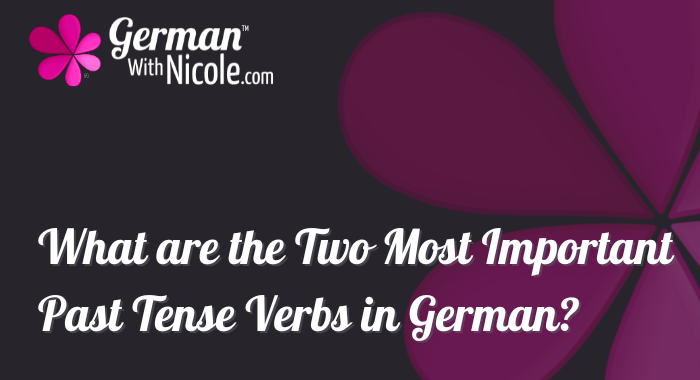What are the Two Most Important Past Tense Verbs in German?

When you first learn German - or first start learning German - you say everything in the present tense. You learn only a little bit of the past tense, mainly the two verbs here, and then later you learn the Perfekt, or the spoken past tense (Ich bin gefahren. Wir haben ein Buch gelesen.).
This is the order you would ideally learn everything in:
Present tense --> these two verbs --> a bunch of the Perfekt
If you learn the past tense in any other order than that, it is out of order.
No exceptions.
If you've jumped from the present to the Perfekt, or you don't have a handle on these two verbs, then press pause on the Perfekt and get a good handle on these two first.
Why?
Because they are the easiest, most widely used and easy to understand past tense verbs in German.
Here are the two most important past tense verbs for you to learn in German:
1. war
"War" (pronounced VAR like CAR) is the past tense of sein - to be.
So in addition to saying "Ich bin in Frankfurt" and "Wir sind in Deutschland" you can now say:
- Ich war in Frankfurt. ~ I was in Frankfurt.
- Wir waren in Deutschland. ~ We were in Germany.
- aaaanything else that took place before this moment.
If you haven't covered a whole lot of territory in German, you can still get your point across with "war."
Try these horrible sentences - does my point get across?
- Ich war Bibliothek und ich war Supermarkt.
- Wir waren Stuttgart und in Konzert in Bachakademie.
- Ihr wart Frankreich? Ja?!
You probably already understand those sentences, as grammatically horrible as they are.
Here are the corrected versions (please learn these instead):
- Ich war in der Bibliothek und im Supermarkt. ~ I was in the library and in the super market.
- Wir waren in Stuttgart im Konzert von der Bachakademie. ~ We were in Stuttgart in a concert from the Bachakademie.
- Ihr wart in Frankreich? Wirklich?! ~ You guys were in France? Really?!
Download the free "war" card:
Here's a free 4x6 card with the conjugations of "war" on it. Click the button to download the card and practice with it.
2. hatte
"Hatte" (pronounced HAH-te) is the past tense of haben - to have.
So in addition to saying "Ich habe ein Buch" and "Wir haben zwei Katzen" you can now say:
- Ich hatte ein Buch. ~ I had a book.
- Wir hatten zwei Katzen. Jetzt nur eine. ~ We had two cats. Now only one. (Wie traurig! How sad!)
- aaaanything else you or someone else had before this moment.
Even without a ton of grammar practice, you can still get your point across with "hatte."
Try these horrible sentences - does my point get across?
- Ich hatte EUR 50 und jetzt EUR 0. Oh nein!
- Wir hatten wir Kinder drei Hunde.
- Ihr hattet keine Schokolade? Nicht gut.
Those were possibly painful to read, so here are the corrected versions (please learn these instead):
- Ich hatte EUR 50 und jetzt habe ich nichts. Oh nein! ~ I had EUR 50 and now I have nothing! Oh, no!
- Wir hatten als Kinder drei Hunde. ~ When we were kids we had three dogs.
- Ihr hattet wirklich keine Schokolade? Oh, das ist nicht gut. ~ You really had no chocolate? Oh, that's not good.
Download the free "hatte" card:
Here's a free 4x6 card with the conjugations of "hatte" on it. Click the button to download the card and practice with it.
Das ist genug für heute.
Really, that's enough for today! Learn these two verbs, use the cards, and practice making simple sentences like the ones I wrote above. They can be incorrect, that's OK - the main thing is you understand how to use the verbs.
Categories
- A1 (69)
- A2 (54)
- B1 (46)
- B2 (23)
- C1 (22)
- Deutsch lernen (80)
- Einkaufen (15)
- Essen (12)
- Grammatik (23)
- Hören (14)
- Landeskunde und Kultur (50)
- Lesen (11)
- Musik (5)
- Nachrichten (4)
- Podcast (64)
- Pronunciation (3)
- Schreiben (3)
- Schwäbisch (4)
- Spiele und Spaß (Games and Fun) (12)
- Sprechen (13)
- Vokabeln (39)
- Video (11)
Would you like to hear about future German classes with Frau Warner?
With the E-Post, you'll receive information on German class registration and goings-on in German classes, all written by Frau Warner. You'll receive an email on Tuesdays, plus an extra email or two when class registration opens or there's something new.
0 comments
Leave a comment